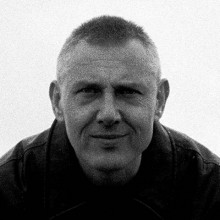Polish literature

Eugeniusz Tkaczyszyn-Dycki
Born in 1962 near Lubaczow, he is a poet and newspaper columnist who read Polish at university. He has published six volumes of poetry and a collection of newspaper articles, and is a winner of the Barbara Sadowska prize, Nike Prize'2009 and Gdynia Literary Award'2009. He lives in Warsaw.
One of Poland’s most original and also (as his publisher claims) most popular poets, he has devised his own poetical style, the source of which some critics have identified as baroque poetry, and others as Ukrainian folklore. He enjoys using repetitions and leitmotifs (the poems in his books are numbered, arranged in a cycle), and often publishes several versions or expressions of the same motif alongside each other. Also typical for him is neo-semanticism, i.e. using existing words with a new meaning, especially archaic words, or words deemed vulgar. On the thematic side, Dycki’s poetry investigates and redefines the links between death and the erotic, obsessively returning (especially in his early collections) to the motifs of the funeral, the cemetery and the danse macabre, carefully placing them in the context of situations that are symbolic of a “youth lifestyle” and liberal morality. The poet is interested in states of being that lead to exclusion – schizophrenia, prostitution, homelessness and homosexuality. Dycki possesses an unusual ability to present drastic problems and situations in a masterful, awe-inspiring way. The elements of “gallows humour” that appear in his generally sombre poems are very effective.
Dycki’s newspaper articles, published in the quarterly Kresy [“Borderlands”] and collected in a volume entitled Zaplecze [“Subsidiaries”], have a decidedly comical tone, though as a rule they are about the literature of centuries past (especially that of the Polish eastern borderlands), which the poet has discovered in his family library. Red through Dycki’s eyes, nineteenth-century popular books, educational medical compendia and whimsical devotional works undergo a wonderful rebirth, becoming interesting and funny, and the characters that appear in them take on colour. In these articles, which are fascinating in terms of both language and facts, the predominant feature is an interest in all manner of existence, whether fictional, or ancient, or treated as demonstration material, thanks to which, despite his total lack of interest in topical issues, Dycki’s pieces can successfully compete with the most up-to-date trends in modern art.
BIBLIOGRAPHY
- Nenia i inne wiersze, Lublin, Związek Literatów Polskich, 1990
- Peregrynarz, Warszawa, Przedświt 1992
- Młodzieniec o wzorowych obyczajach, Warszawa, Przedświt 1994
- Liber mortuorum, Lublin, Stowarzyszenie Literackie Kresy 1997
- Kamień pełen pokarmu, Warszawa, Świat Literacki 1999 (zawiera również wybór wierszy z wcześniejszych tomów)
- Przewodnik dla bezdomnych niezależnie od miejsca zamieszkania, Legnica: Biuro Literackie Port Legnica 2000
- Zaplecze (felietony), Legnica: Biuro Literackie Port Legnica 2002
- Daleko stąd zostawiłem swoje dawne i niedawne ciało, Kraków: Zielona Sowa, 2003
- Przyczynek do nauki o nieistnieniu, Legnica: Biuro Literackie Port Legnica 2003
- Dzieje rodzin polskich, Warszawa: Sic!, 2005
- Poezja jako miejsce na ziemi (1989-2003), Wrocław: Biuro Literackie, 2006
- Piosenka o zależnościach i uzależnieniach, Wrocław: Biuro Literackie, 2008
- Rzeczywiste i nierzeczywiste staje się jednym ciałem, Wrocław: Biuro Literackie, 2009
- Imię i znamię, Wrocław: Biuro Literackie, 2011.
- Kochanka Norwida, Wrocław: Biuro Literackie, 2014.
- A collection of articles about him has also appeared, entitled Jesień już Panie a ja nie mam domu [“Autumn already, O Lord, and I haven’t got a home”], Kraków, Ha!art 2001, ed. G. Jankowicz.
TRANSLATIONS
Bulgarian:
- Tova tâlo možeše da b''de moe: 83 izbrani stihotvoreniâ [selected poems], transl. Panajot Karag'ozov, Sofia: IK "EMAS", 2017.
Czech:
- Píseň o návycích a závislostech [Piosenka o zależnościach i uzależnieniach], transl. Michael Alexa, Ostrava: Protimluv, 2018.
English:
- Peregrinary [Peregrynarz], transl. Bill Johnston, Brookline: Zephyr Press, 2008.
German:
- Geschichte polnischer Familien [Dzieje rodzin polskich], transl. Doreen Daume, Wien: Edition Korrespondenzen, 2012.
- Tumor linguae [Poezja jako miejsce na ziemi], transl. Michael Zgodzay, Uljana Wolf, Wien: Edition Korrespondenzen, 2015.
- Norwids Geliebte : Gedichte transl. Michael Zgodzay, Uljana Wolf, Wien: Edition Korrespondenzen, 2019.
Italian:
- Una notizia dell'ultimo minuto [selected poems], transl. Alessandro Amenta, Lorenzo Constantino, Rovigo: Il Ponte del Sale, 2012.
Serbian:
- Stvarno i nestvarno postaje jedno telo : 111 pesama [Rzeczywiste i nierzeczywiste staje się jednym ciałem : 111 wierszy], transl. Milica Markić, Beograd: Areté, 2018.
Slovenian:
- Kamen poln hranila. Knijga pesmi iz let 1987–1999 [Kamień pełen pokarmu. Księga wierszy z lat 1987–1999], transl. Primož Čučnik, Ljubljana: Center za slovensko književnost, 2005.
Spanish:
- Quieres decir que estás solo: (Antología 1990-2016), transl. Marta Eloy Cichocka, Nuevo León: Ediciones Atrasalante, 2018.
Ukrainian:
- Sin grudnichi [Wybór poezji], transl. Marianna Kijanowska, Tarnopol: Krok, 2014.